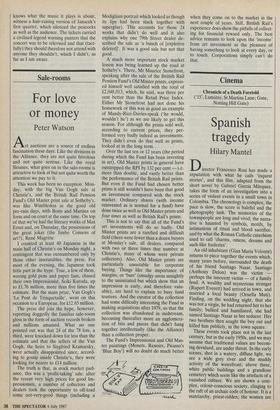Cinema
Chronicle of a Death Foretold ('15', Lumiere, St Martins Lane; Gate, Notting Hill Gate)
Spanish tragedy
Hilary Mantel
Director Francesco Rosi has made a reputation with what he calls 'inquest stories', and this film, adapted from the short novel by Gabriel Garcia Marquez, takes the form of an investigation into a series of violent events in a small town in Colombia. The chronology is complex, the pace is slow, the score is baleful and the photography lush. The memories of the townspeople are long and vivid; the narra- tive is haunted by symbols, motifs, by intimations of ritual and blood sacrifice, and by what the Roman Catholic catechism used to call 'charms, omens, dreams and such-like fooleries'.
An old inhabitant (Gian Maria Volontd) returns to piece together the events which, many years before, surrounded the death of his friend Santiago Nasar. Santiago (Anthony Delon) was the victim perhaps the innocent victim — of a family feud. A wealthy and mysterious stranger (Rupert Everett) had arrived in town, and married a local beauty (Omella Muti). Finding, on the wedding night, that she was not a virgin, he had returned her to her family; bullied and humiliated, she had named Santiago Nasar as her seducer. Her two brothers then sought the boy out and killed him publicly, in the town square. These events took place not in the last century, but in the early 1950s, and we may assume that traditional values are becom- ing devalued, are under threat. In the early scenes, shot in a watery, diffuse light, we see a wide grey river and the muddy activity of the waterfront; above these, white public buildings and a grandiose cemetery which seem like the artefacts of a vanished culture. We are shown a com- plex, colour-conscious society, clinging to the raft of an archaic code of honour. It is a matriarchy, priest-ridden; the women are zealous in enforcement of the unwritten rules which protect their status, and the men are their instruments, ruled by their need for sex and their need to conform.
The Vicario twins are reluctant killers; they inform everyone of their intentions, they show their butcher's knives in public, and the fate awaiting Nasar is discussed in bars and on street corners. He is a walking dead man; the tension is skilfully main- tained. Each of the townspeople, for their own reasons, fail to warn him, and Rosi convicts them of 'collective responsibility' for the death; and yet he shows us more, an alarming psychic collusion. Already, be- fore the marriage, the stranger had sub- verted their values. You would imagine them concerned about blood-lines; this man is of unknown provenance, but they grapple him to their souls because he has money. He throws it about, too, buying his bride, trampling on sensitivities. By con- doning the killings, observing the harsh tradition, the townspeople have cleared a debt; they have paid in their own coinage of violence.
There is no moral distancing here, so we are drawn into this absurd world where a man 'must' kill another man for 'honour'. Any distancing is visual; the camera pro- jects its creatures into a soft-edged, mystic- al, half-mythical world where their nasty old notions make a kind of sense. Rosi is concerned to create 'emblematic' charac- ters; this may explain the zombified acting.
There are those who think Rupert Everett a very fine screen actor, and others who think he has all the charisma of a speak-your-weight machine; this film will hardly resolve the question. He is posed, rather than directed; he has an unpleasant way of leaving his mouth hanging open, and what he means to convey by this is anybody's guess. Ornella Muti, in the scenes where she is asked to portray her older self, is an embarrassment. The others appear victims of a director who says he is not interested in psychology. Where that interest is lacking, acting becomes manner- isms, mechanics; and even they — the film is released in a Spanish version, with subtitles — seem to have faltered because of the problems of a cast with different native languages.
Perhaps this doesn't matter. The film is beautiful to look at, and remarkable in the clarity of its tragic vision. Yet it often seems at odds with Marquez' book and at odds with the director's stated aims. Rosi, if we have understood him, does not think that violence is inherent in human society; he believes it is a result of colonialism. The violence of Colombia derives from Spanish domination; Sicily has the Mafia because formerly it had the Arabs, the Normans, etc. (No doubt if he made a film about India he would show us how the British were responsible for suttee.) What he has done here is to splice the brutal with the picturesque, the mundane with the myste- rious, so that we are unsure whether the victim's fate is written in the stars or a product of the laws of economics; whether it is a question of magic, or a question of cash.



















































 Previous page
Previous page